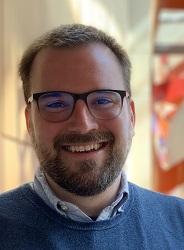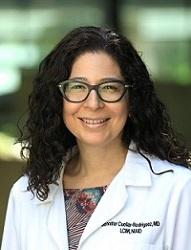
Major Areas of Research
- Virus-host dynamics at single-cell resolution
- Virus evolution within and across hosts
- Systems biology of virus infection
- RNA Viruses: Picornaviridae, Flaviviridae, and others
Program Description
The Quantitative Virology and Evolution Unit focuses on understanding the dynamic and heterogenous processes of RNA virus infection and evolution. Using experimental tools, including high-resolution sequencing and live-cell microscopy, along with computational phylogenetic and bioinformatic tools, we characterize virus evolution and host-virus interactions across spatial and temporal scales. Projects in the lab include single-cell and single-genome sequencing of within-host virus evolution and host responses, phylogenetic reconstruction and evolutionary biochemistry in emerging RNA viruses, and design and analysis of mutational and functional genetic screens.
Biography
Patrick T. Dolan, Ph.D., is an experimental virologist and computational biologist whose work focuses primarily on the evolution and host-virus interactions of positive-sense RNA viruses. Patrick earned his B.S. degree in microbiology and molecular genetics from Michigan State University, where he worked in the laboratory of professor Yong-Hui Zheng on the antiviral function of APOBEC3 cytidine deaminases in HIV-1. Patrick earned his Ph.D. in biological sciences in 2014 from Purdue University, where he studied the form and function of the hepatitis C virus-host protein interaction network under the supervision of professor Douglas J. LaCount and co-advisor professor Michael Gribskov. Patrick then pursued postdoctoral studies at Stanford University and University of California, San Francisco, in the laboratories of professors Raul Andino and Judith Frydman where he developed methods to understand the evolutionary dynamics of enteroviruses and flaviviruses in alternative host environments. In the fall of 2021, Patrick began as unit chief of the Quantitative Virology and Evolution Unit at NIAID in Bethesda, MD, where he will continue to study the forces that shape the long- and short-term evolution of RNA virus populations.
Selected Publications
Dolan PT, Taguwa S, Rangel MA, Acevedo A, Hagai T, Andino R, Frydman J. Principles of dengue virus evolvability derived from genotype-fitness maps in human and mosquito cells. Elife. 2021 Jan;10:e61921.
Dolan PT, Whitfield ZJ, Andino R. Mapping the Evolutionary Potential of RNA Viruses. Cell Host Microbe. 2018 Apr;23(4):435-446.
Xiao Y, Dolan PT, Goldstein EF, Li M, Farkov M, Brodsky L, Andino R. Poliovirus intrahost evolution is required to overcome tissue-specific innate immune responses. Nat Commun. 2017 Aug;8(1):375.
Dolan PT, Roth AP, Xue B, Sun R, Dunker AK, Uversky VN, LaCount DJ. Intrinsic disorder mediates hepatitis C virus core-host cell protein interactions. Protein Sci. 2015 Feb;24(2):221-35.
The Quantitative Virology and Evolution Unit focuses on understanding the dynamic and heterogenous processes of RNA virus infection and evolution. Using experimental tools, including high-resolution sequencing and live-cell microscopy, along with computational phylogenetic and bioinformatic tools, we characterize virus evolution and host-virus interactions across spatial and temporal scales. Projects in the lab include single-cell and single-genome sequencing of within-host virus evolution and host responses, phylogenetic reconstruction and evolutionary biochemistry in emerging RNA viruses, and design and analysis of mutational and functional genetic screens.
Dábilla N, Dolan PT. Structure and dynamics of enterovirus genotype networks. Sci Adv. 2024 Jun 21;10(25):eado1693.
Bakhache W, Symonds-Orr W, McCormick L, Dolan PT. Deep mutation, insertion and deletion scanning across the Enterovirus A proteome reveals constraints shaping viral evolution. Nat Microbiol. 2025 Jan;10(1):158-168.
Bakhache W, Shen A, Symonds-Orr W, Freeman MC, Dolan PT. Novel reporter constructs to accelerate antiviral and therapeutic discovery for Enterovirus-A71. Antiviral Res. 2025 Feb 1;235:106094.
Dolan PT, Taguwa S, Rangel MA, Acevedo A, Hagai T, Andino R, Frydman J. Principles of dengue virus evolvability derived from genotype-fitness maps in human and mosquito cells. Elife. 2021 Jan;10:e61921.
Dolan PT, Whitfield ZJ, Andino R. Mapping the Evolutionary Potential of RNA Viruses. Cell Host Microbe. 2018 Apr;23(4):435-446.
Xiao Y, Dolan PT, Goldstein EF, Li M, Farkov M, Brodsky L, Andino R. Poliovirus intrahost evolution is required to overcome tissue-specific innate immune responses. Nat Commun. 2017 Aug;8(1):375.
- Virus-host dynamics at single-cell resolution
- Virus evolution within and across hosts
- Systems biology of virus infection
- RNA Viruses: Picornaviridae, Flaviviridae, and others
Jennifer M. Cuellar-Rodriguez, M.D.

Major Areas of Research
- Infections in immunocompromised host
- Transplant for primary immunodeficiencies
Program Description
The Transplant Infectious Diseases Consult Service is composed of experienced transplant infectious diseases physicians. In collaboration with the Blood and Immune Deficiency Cellular Therapy Program (BID-CTP), a clinical initiative that spans across four institutes within NIH, and with the Experimental Transplantation and Immunology Branch (ETIB), the consult service provides direct patient care, educational support and develops institutional guidelines for the prevention and management of infections for patients undergoing hematopoietic stem cell transplant, gene or cellular therapies at the NIH clinical center.
Biography
Dr. Cuellar Rodriguez received her medical degree from the Universidad Autónoma de Guadalajara (Guadalajara, Mexico) in 1999 and her Diploma in Tropical Medicine and Hygiene from the London School of Hygiene and Tropical Medicine (London, UK) in 2003. She completed an Internal Medicine residency and Infectious Diseases fellowship at the at the Instituto Nacional de Ciencias Médicas y Nutrición Salvador Zubirán (INCMNSZ) in Mexico City, followed by a Clinical Fellowship in Transplant Infectious Diseases at the Cleveland Clinic in Cleveland, OH. In 2009, she joined NIAID as a clinical fellow (visiting program) where she completed an advanced infectious diseases fellowship (academic/research track) in infections in immunocompromised host. She was later promoted to staff clinician in 2011. In 2014, Dr. Cuellar Rodriguez returned to the INCMNSZ to serve as head of the Transplant Infectious Diseases Section, within the Department of Infectious Disease, where she remained until 2019. She then returned to NIAID in the Division of Intramural Research and is now the director of the Transplant Infectious Diseases Consult Service.
Research Group
Juan Gea-Banacloche, M.D., Staff Clinician
Mark Parta, M.D., MPHTM, Physician III
Publications
Training Program(s)
The Transplant Infectious Diseases Consult Service is composed of experienced transplant infectious diseases physicians. In collaboration with the Blood and Immune Deficiency Cellular Therapy Program (BID-CTP), a clinical initiative that spans across four institutes within NIH, and with the Experimental Transplantation and Immunology Branch (ETIB), the consult service provides direct patient care, educational support and develops institutional guidelines for the prevention and management of infections for patients undergoing hematopoietic stem cell transplant, gene or cellular therapies at the NIH clinical center.
- Survey of Pneumocystis Infections in NIH patients, Principal Investigator
- A Phase II Study of Allogeneic Hematopoietic Stem Cell Transplant for Subjects with VEXAS (Vacuoles, E1 enzyme, X-linked, Autoinflammatory, Somatic) Syndrome, Associate Investigator
- A Phase II Study of Allogeneic Hematopoietic Stem Cell Transplant for Patients with Primary Immunodeficiency Diseases, Associate Investigator
- Detection and Characterization of Host Defense Defects, Associate Investigator
- Allogeneic Hematopoietic Stem Cell Transplant for Patients with Mutations in GATA2 or the MonoMAC syndrome, Associate Investigator
- Screening Protocol for Detection and Characterization of Infections and Infection Susceptibility, Associate Investigator
- Natural History Study of the Complications Associated with Allogeneic Hematopoietic Stem Cell Transplantations, Associate Investigator
Research Group
- Juan Gea-Banacloche, M.D., Staff Clinician
- Mark Parta, M.D., MPHTM, Physician III
Training Program
- Infections in immunocompromised host
- Transplant for primary immunodeficiencies
NIAID Select Agent Research Awards Process
NIAID staff and awardees use this process in conjunction with the related Select Agent Awards SOP.
Follow the steps shown in the sections below:
NBBTP/IRTA Stipends and Benefits
In addition to the intensive leadership development and professional growth that the Fellowship offers, the National Biosafety and Biocontainment Training Program (NBBTP)/Intramural Research Training Award (IRTA) Fellowship includes the following benefits. The NBBTP/IRTA arranges several logistical details on Fellows’ behalf with the expectation that Fellows will take ownership of their overall experience. Read on below to learn more about how these items apply:
NBBTP/IRTA Fellowship Program Eligibility
Application Procedure for the NBBTP/IRTA Fellowship
NBBTP/IRTA Contact Information
We appreciate your interest in this rigorous biosafety and biocontainment training program. We will address all correspondence promptly. For questions you may have about the National Biosafety and Biocontainment Training Program (NBBTP)/Intramural Research Training Award (IRTA) Fellowship, please contact:
Email: NBBTP@nih.gov
NIH Division of Occupational Health & Safety
Phone: (301) 496-2960
NBBTP/IRTA Current Fellows and Alumni
NBBTP/IRTA Fellows are trained specifically to support high containment research environments. Upon graduating from the program, NBBTP/IRTA alumni begin work as biorisk professionals with the knowledge and skills necessary to meet the scientific, regulatory, biocontainment, biosafety, engineering, communications, management, and public relations challenges associated with the conduct of research in these facilities.
Learn more about current NBBTP/IRTA Fellows and Alumni:
NBBTP/IRTA Professional Development
Curriculum Overview
The NBBTP/IRTA curriculum is based on seven core components: Biosafety; Biocontainment; Biosecurity; Occupational Health and Safety; Animal Health and Safety, Leadership and Management, and Applied Research. Through mentored didactic and experiential learning opportunities, Fellows will learn principles and practices that will build their knowledge and confidence as biorisk professionals.
About NBBTP/IRTA
The National Biosafety and Biocontainment Training Program (NBBTP)/Intramural Research Training Award (IRTA) offers two-year postbaccalaureate and postdoctoral fellowships.

